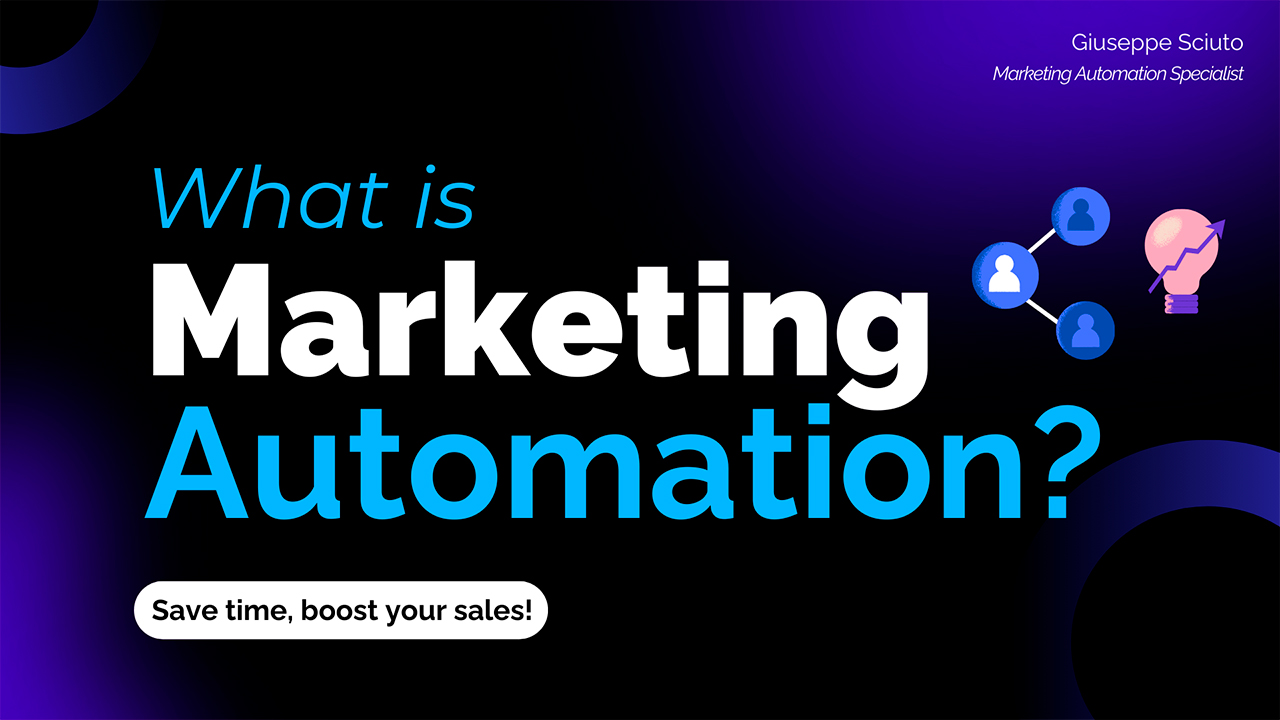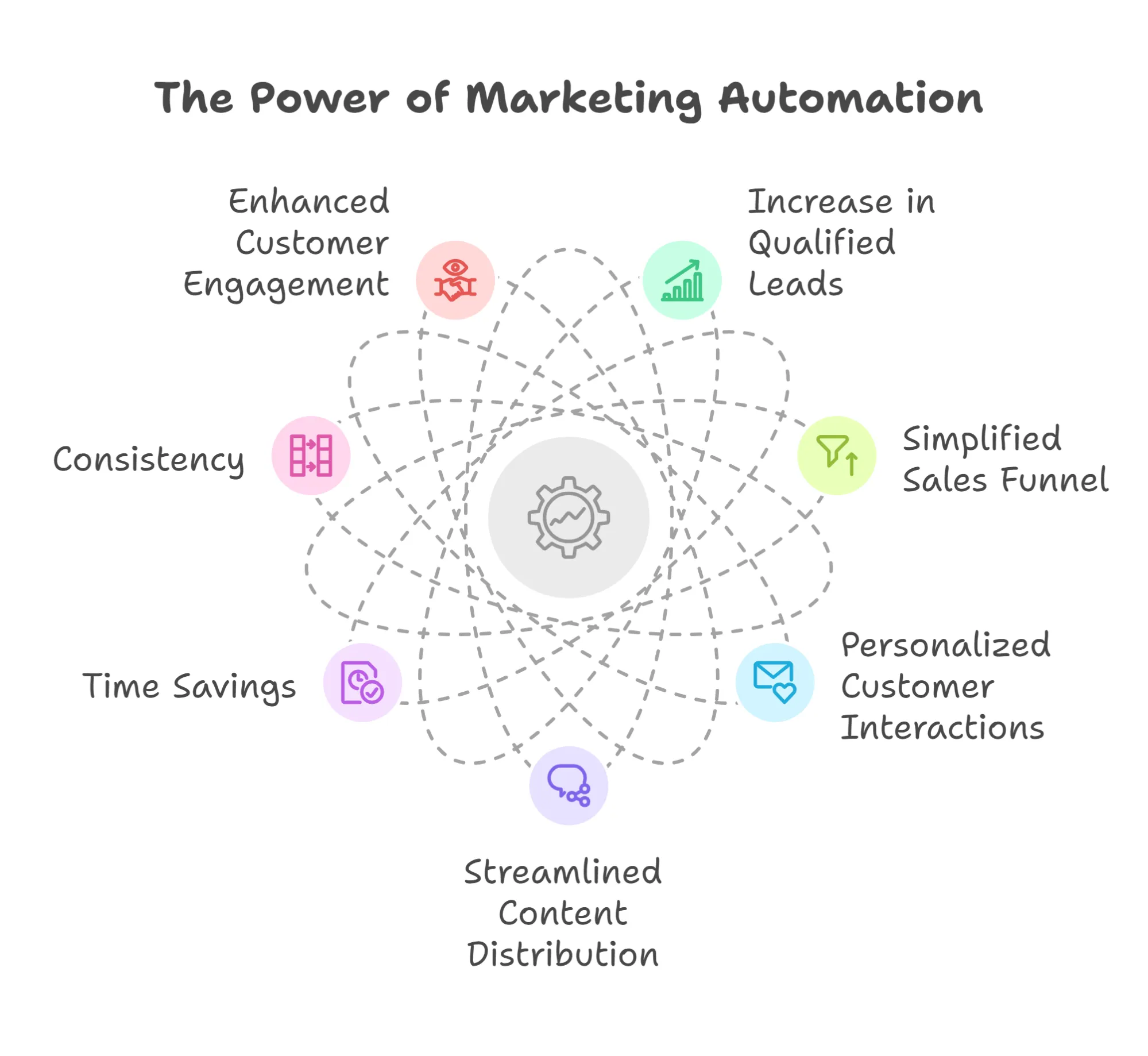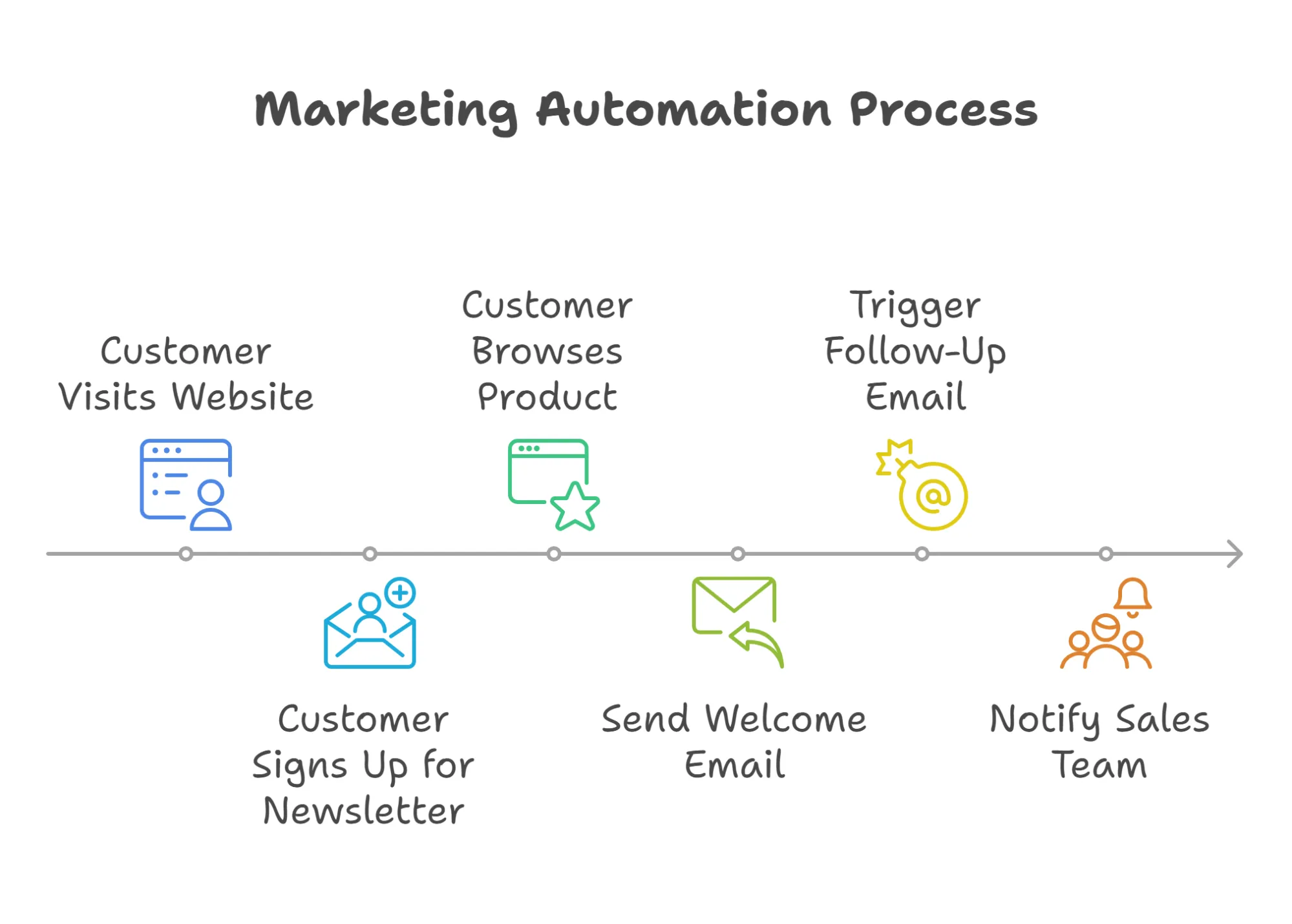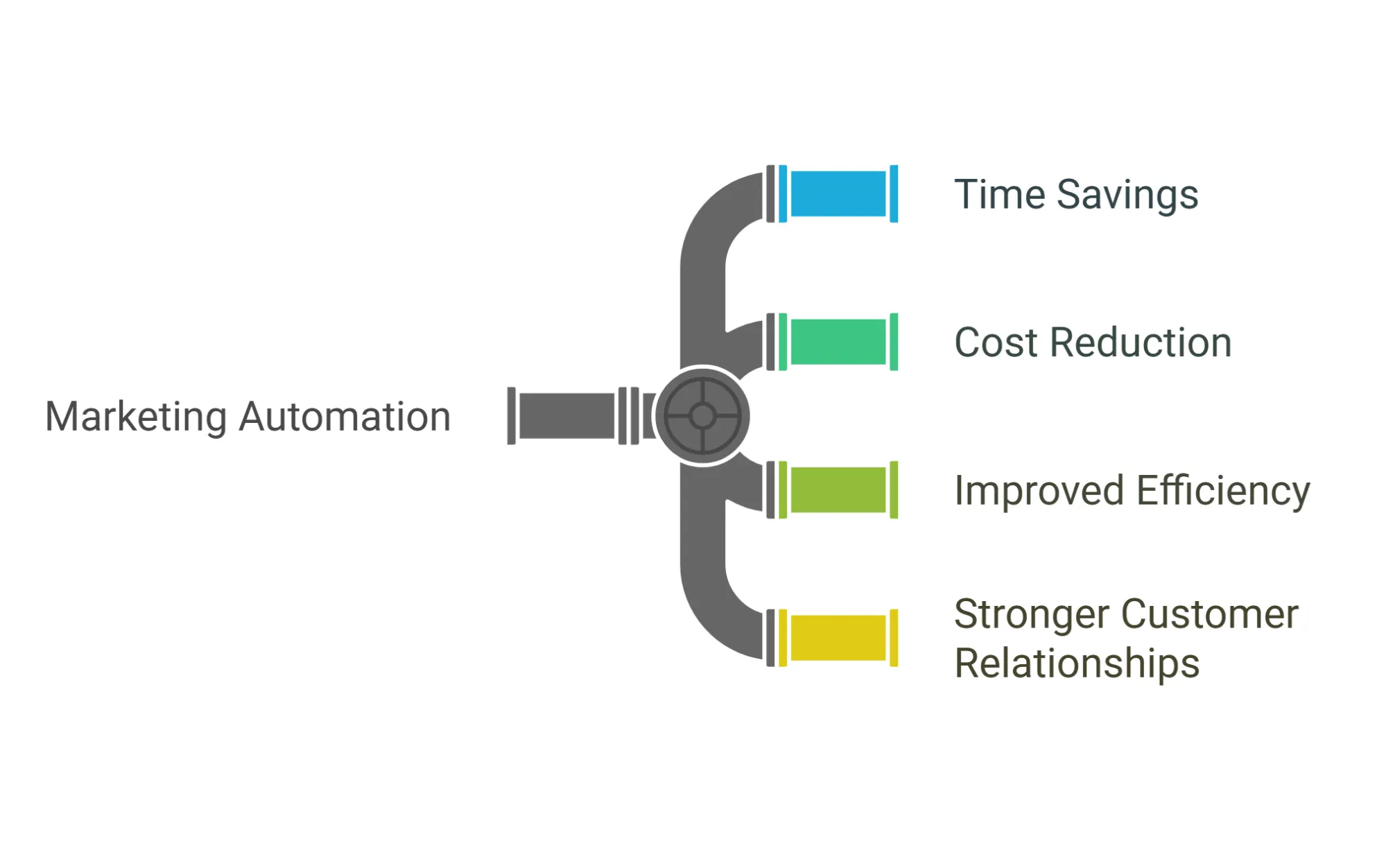· 16 min read
What Is Marketing Automation and Why Does Your Business Need It?
Discover what marketing automation is, its benefits, examples, and strategies to make it work for your business. Achieve smarter growth today!

Introduction
Did you know that businesses using marketing automation see an average of a 451% increase in qualified leads? That’s no small feat! In today’s fast-paced world, where every second counts, marketing automation has become a must-have tool for businesses looking to grow smarter, not harder.
As a marketing automation expert, I’ve seen firsthand how these automation tools can transform small businesses and startups.
Whether you’re aiming to simplify your sales funnel by automating lead qualification or personalizing customer interactions through tailored email campaigns, automation can do it all.
You can even streamline content distribution across multiple platforms effortlessly.
These tools not only save time but also ensure consistency and enhance customer engagement at every touchpoint.

This article is your ultimate guide to understanding marketing automation, its benefits, and why it’s time for your business to hop on board. Let’s dive in and explore how you can harness the power of marketing automation to achieve amazing results!
Why Marketing Automation Matters
As customer expectations continue to rise higher than ever, staying ahead of the competition means working smarter. Marketing automation isn’t just about saving time—it’s about creating meaningful connections at scale.
For example, by using automated email campaigns, a small business can send personalized messages to hundreds of customers based on their preferences and behavior. This approach not only builds stronger relationships but also drives more meaningful engagement with minimal effort. By leveraging these tools, businesses can:
- Deliver personalized content to the right audience at the right time.
- Automate repetitive tasks, freeing up resources for strategic planning.
- Track and report performance metrics to continually refine campaigns. For instance, marketing automation tools can track email open rates, click-through rates, and customer conversion rates, helping you identify what works and where improvements are needed.
The potential is limitless, and the benefits are clear. Marketing automation is the bridge between efficiency and impactful engagement, making it an essential investment for modern businesses.
For example, companies that implement automation report up to a 14.5% increase in sales productivity and a 12.2% reduction in marketing overhead, showcasing its tangible value.
What Is Marketing Automation?
Marketing automation is a game-changer for businesses today! It’s all about using technology and tools to make marketing tasks easier, faster, and more efficient. Instead of doing repetitive tasks like sending emails, tracking customer activities, or updating CRM systems by hand, automation takes care of them.
This saves time and lets businesses focus on bigger things like planning strategies and coming up with creative ideas.
But it’s not just about saving time—it’s about creating smarter and more personal experiences for your customers. With data and AI, businesses can adjust their messages based on what customers do, like, or buy.
It’s like having a digital assistant that works 24/7, making sure every interaction with your customers is meaningful and effective.
How Marketing Automation Works

In practice, marketing automation tools are designed to work seamlessly across various channels—emails, social media, websites, and more.
For example, let’s say a potential customer visits your website, signs up for your newsletter, and browses a product. Marketing automation can immediately:
- Send a personalized welcome email with helpful links.
- Trigger a follow-up email offering discounts on the product they viewed.
- Notify your sales team about the lead for further nurturing.
These processes happen automatically, but they feel personal to the customer! Behind the scenes, tools like HubSpot or ActiveCampaign use workflows, algorithms, and triggers to make all of this magic happen.
Key Features of Marketing Automation Tools
The beauty of marketing automation tools lies in their versatility. Here are some of the standout features they often include:
- Lead Scoring and Tracking: Tools analyze user behavior to prioritize high-potential leads.
- Multi-Channel Campaigns: Manage email, SMS, and social media campaigns from one dashboard.
- Personalization at Scale: Automatically create tailored content based on customer profiles.
- Analytics and Reporting: Easily measure and report marketing automation performance, like click-through rates, engagement levels, and ROI.
- Integration Capabilities: Tools seamlessly integrate with CRMs and other business systems for a unified workflow.
How Marketing Automation Can Be Used
Marketing automation isn’t just a trendy buzzword; it’s a proven way to simplify your workflows, boost efficiency, and create meaningful customer interactions. By utilizing innovative marketing automation uses, businesses can go beyond repetitive tasks and focus on scaling their efforts.
Whether it’s crafting personalized emails, tracking campaign performance, or managing complex sales funnels, marketing automation tools for start-ups and established businesses alike can transform how you connect with your audience.
Let’s explore some practical applications of marketing automation and how these tools can deliver unmatched automation benefits to your business.
Personalizing Customer Experiences Through Segmentation
One of the most powerful advantages of marketing automation is its ability to create personalized customer experiences. With content marketing automation, you can divide your audience into specific segments based on their behavior, preferences, or purchase history.
Imagine reaching every customer with a message that feels like it was written just for them!
For instance:
- A fitness app could send personalized workout plans to users based on their fitness goals.
- A clothing brand might offer style recommendations based on browsing history.
By automating this segmentation process, you ensure your customers feel understood and valued. These key benefits of marketing automation help boost engagement, loyalty, and, ultimately, sales.
Automating Product Events and Promotions
Planning product launches or running promotions doesn’t have to be a headache. With product events marketing automation, you can plan and execute campaigns effortlessly.
Tools designed for automation let you schedule announcements, organize social media posts, and send emails automatically.
For example:
- Set up a countdown to your product launch across platforms.
- Share exclusive early-bird offers with email subscribers.
- Automate thank-you emails after product events to keep the conversation going.
By using these automation advantages, you ensure smooth and timely execution of all your campaigns, leaving no stone unturned in reaching your audience.
Reporting Marketing Automation Performance for Data-Driven Decisions
A great campaign is nothing without data to back it up. With reporting marketing automation performance, you can gain insights into what’s working and what needs improvement.
These tools track metrics like email open rates, click-throughs, and conversions, giving you the power to make smarter decisions.
For example, imagine you’ve launched a sale, but the response is lukewarm. A quick look at performance reports might reveal that your emails are being sent at the wrong time.
By tweaking your schedule, you can instantly improve results and maximize the benefits of automation.
Smart Marketing Automation Strategies for Scaling Your Efforts
Scaling your business doesn’t have to mean hiring more people or stretching your resources thin. With genius marketing automation, small businesses and startups can streamline repetitive tasks while focusing on growth.
Here are a few clever strategies to try:
- Use funnel marketing automation to guide leads smoothly through every stage of your sales process.
- Set up predictive analytics to anticipate customer needs and provide proactive solutions.
- Automate recurring social media posts to keep your brand visible without extra effort.
These strategies showcase the key benefits of marketing automation, including time savings, improved productivity, and enhanced customer satisfaction. By integrating these tools into your workflow, you can take your business to new heights.
What Can Marketing Automation Do for Your Business?
Businesses today need more than traditional strategies to stay competitive. This is where marketing automation steps in, offering tools and systems to revolutionize how companies interact with their customers and streamline their workflows.
Let’s explore the automation advantages and how they translate into tangible results for your business.
Overview of Automation Advantages for Businesses
 At its core, marketing automation allows businesses to perform repetitive tasks like email campaigns, lead scoring, and customer segmentation with minimal manual effort. But the benefits of automation go beyond convenience.
At its core, marketing automation allows businesses to perform repetitive tasks like email campaigns, lead scoring, and customer segmentation with minimal manual effort. But the benefits of automation go beyond convenience.
They help companies save time, cut costs, and improve efficiency while building stronger customer relationships.
For instance, instead of sending generic emails to an entire list, marketing automation tools enable you to send personalized messages tailored to specific customer needs and behaviors.
Whether you’re managing a sales force, running product launches, or nurturing leads, the advantages of marketing automation make it indispensable.
Key Benefits of Marketing Automation
1. Time Savings
One of the most notable automation benefits is time efficiency. Automating repetitive tasks like scheduling social media posts or setting up email workflows frees up valuable hours for your team.
This time can be redirected toward strategic planning and creativity—areas where human input is irreplaceable.
Example:
- A small e-commerce business uses content marketing automation to schedule emails for abandoned carts, product recommendations, and seasonal promotions. They save hours weekly while increasing sales.
2. Improved Lead Nurturing
Converting prospects into loyal customers requires consistent communication and follow-ups, which can be overwhelming when done manually. With funnel marketing automation, you can guide leads through every stage of the sales journey seamlessly.
How does it work?
- Automated workflows ensure that leads receive the right information at the right time.
- Predictive tools anticipate customer needs, sending tailored offers based on behavior.
Example: A software startup uses marketing automation tools for start-ups to send educational resources to new leads, increasing conversions by 35%.
3. Improved ROI
The key benefits of marketing automation include measurable ROI improvements. By analyzing customer data and refining strategies based on performance metrics, businesses can make smarter, data-driven decisions.
Automation ensures:
- Higher email open and click-through rates due to personalization.
- Better allocation of resources to high-performing campaigns.
Example: An agency uses reporting marketing automation performance to identify underperforming ads and reallocate budgets, boosting their ROI by 20%.
4. Specific Automation Benefits for Sales Force Advantages
For sales teams, automation simplifies workflows and enhances productivity. Imagine a sales force no longer bogged down by administrative tasks like manual data entry or follow-up emails. Automation helps:
- Track leads through CRM systems.
- Automatically schedule follow-ups or reminders.
- Provide real-time performance insights.
This is especially vital for small teams with limited resources. By automating these tasks, businesses can focus on closing deals and growing their customer base.
The Bigger Picture
The advantages of marketing automation extend far beyond individual tasks. They create a cohesive strategy where your marketing and sales teams work in harmony.
Whether you’re aiming for higher productivity, better customer engagement, or long-term growth, marketing automation delivers automation benefits that adapt to your unique business needs.
From innovative marketing automation uses to sales force advantages, this technology equips businesses with the tools to succeed in a competitive market. Why not let marketing automation take some weight off your shoulders?
Marketing Automation Tools and Integration
Marketing automation becomes a game-changer when you use the right tools and integrate them effectively into your existing systems.
Let’s explore some of the most popular marketing automation tools for start-ups, integration strategies, and the critical role of content marketing automation and funnel marketing automation in optimizing workflows and boosting conversions.
Popular Marketing Automation Tools for Startups
Startups often work with tight budgets and small teams, making marketing automation tools for startups essential. These tools simplify complex processes, improve productivity, and help businesses scale. Here are a few examples:
- HubSpot: Ideal for startups, offering features for email marketing, lead nurturing, and CRM integration.
- Mailchimp: Affordable and user-friendly for email campaigns and audience segmentation.
- Zapier: Connects apps to automate workflows without requiring coding knowledge.
- ActiveCampaign: Provides advanced funnel marketing automation and robust analytics tools.
These platforms enable startups to automate tasks like email marketing, customer follow-ups, and lead tracking, saving time and improving efficiency.
Tips for Integrating Marketing Automation Tools Into Existing Systems
Seamless integration is crucial for reaping the full benefits of marketing automation integration. Here are some tips to ensure a smooth transition:
- Start Small and Scale Gradually:
Focus on automating one or two processes initially, such as email workflows or social media scheduling. Gradual adoption minimizes disruptions. - Prioritize Compatibility:
Choose tools that integrate well with your existing CRM, e-commerce, or customer service platforms. For example, HubSpot integrates seamlessly with Shopify for e-commerce businesses. - Train Your Team:
Even the most powerful tools need skilled operators. Offer training sessions to ensure your team understands how to use the platform effectively. - Monitor and Adjust:
Regularly review reporting marketing automation performance to identify areas for improvement and make necessary adjustments.
Benefits of Marketing Automation Integration for Seamless Workflows
Integrating automation tools into your workflows transforms how your business operates. The automation advantages include:
- Increased Efficiency: By eliminating repetitive tasks, your team can focus on more strategic initiatives.
- Better Collaboration: Integration ensures your marketing and sales teams share data and work cohesively.
- Real-Time Insights: Access performance metrics instantly, enabling faster decision-making.
Example:
A startup integrating content marketing automation with its CRM system noticed a 40% increase in lead engagement by delivering personalized content.
Content Marketing Automation: Why It Matters
In today’s digital world, content is king, and content marketing automation ensures it’s delivered effectively. Automating content creation, scheduling, and distribution helps businesses maintain consistency and relevance.
For example:
- Schedule blog posts and social media updates for optimal engagement times.
- Use AI tools to analyze audience behavior and recommend content topics.
- Personalize newsletters with curated articles based on subscriber interests.
When done right, content marketing automation improves brand visibility and strengthens your connection with your audience.
Funnel Marketing Automation to Optimize Conversions
Your sales funnel is the backbone of your customer journey. Funnel marketing automation ensures every stage—awareness, consideration, and conversion—is optimized.
How it works:
- Awareness: Use automated social media ads to attract new leads.
- Consideration: Send educational emails or product demos automatically to nurture prospects.
- Conversion: Automate follow-up emails with exclusive offers to close deals.
Example:
A SaaS company implemented funnel marketing automation and saw a 34% boost in trial-to-paid conversions by automating personalized follow-ups.
The Bottom Line
Choosing the right tools and implementing seamless integrations allow businesses to unlock the true potential of marketing automation.
From simplifying content marketing automation to optimizing sales funnels, these strategies ensure your workflows remain smooth, efficient, and results-driven.
With the right approach, marketing automation becomes more than a tool—it’s a key driver of your success.
Examples of Marketing Automation in Action
To truly understand the power of marketing automation, let’s dive into real-world examples, explore specific content marketing automation use cases, and examine how marketing automation experts drive success.
A placeholder for an example diagram of an automated marketing funnel is included to help visualize the process.
Real-Life Marketing Automation Examples from Successful Businesses
1. Amazon’s Personalized Product Recommendations:
Amazon’s success in e-commerce is partly due to its robust marketing automation system.
By tracking customer browsing history and purchase patterns, Amazon sends personalized recommendations and reminders, encouraging repeat purchases and enhancing the customer experience.
2. HubSpot’s Lead Nurturing Campaigns:
HubSpot leverages funnel marketing automation to guide leads through the sales funnel. From automated welcome emails to personalized blog recommendations, HubSpot ensures potential customers receive value at every stage of their journey.
3. Spotify’s Yearly Wrapped Campaign:
Spotify uses content marketing automation to generate personalized playlists and stats for users, creating a buzz on social media and strengthening brand loyalty.
This campaign is automated yet feels highly tailored, showcasing the potential of personalized marketing at scale.
Use Cases for Content Marketing Automation
Content marketing automation allows businesses to manage and deliver high-quality content without overwhelming their teams. Here are practical use cases:
- Blog Scheduling: Tools like WordPress automate post scheduling, ensuring content is published consistently.
- Email Newsletters: Automated newsletters deliver personalized content based on subscriber preferences, boosting open rates and engagement.
- Social Media Posts: Platforms like Buffer or Hootsuite schedule posts at optimal times, maintaining visibility without manual intervention.
- Dynamic Website Content: Automation tools adjust website content dynamically based on visitor behavior, ensuring relevance and engagement.
These examples demonstrate how businesses can streamline content distribution and maximize impact.
How Marketing Automation Experts Help You in Achieving Success
Marketing automation experts play a critical role in implementing and optimizing these systems. Their expertise ensures businesses:
- Select the Right Tools: Experts evaluate business needs and recommend the most effective marketing automation tools for startups or established organizations.
- Streamline Integration: They ensure smooth marketing automation integration, connecting tools with existing CRMs, e-commerce platforms, or analytics systems.
- Analyze and Optimize Performance: By reporting marketing automation performance, they identify areas for improvement and implement strategies to enhance ROI.
- Develop Scalable Strategies: These professionals design scalable systems that grow alongside the business, enabling seamless expansion.
Consulting and Choosing the Right Marketing Automation Strategy
Selecting the best marketing automation strategy requires more than just tools; it demands expertise, customization, and continuous assessment.
Partnering with marketing automation consulting services can elevate your campaigns, ensuring every step aligns with your business goals.
How Marketing Automation Consulting Can Improve Results
Marketing automation experts bring a wealth of experience to the table. Their insights help businesses:
- Identify Opportunities: Consultants assess existing workflows to spot inefficiencies and recommend tools or processes that save time and enhance performance.
- Streamline Integration: Whether you’re adding new automation tools for startups or enhancing existing systems, consultants ensure smooth marketing automation integration to avoid disruptions.
- Maximize ROI: By fine-tuning campaigns and analyzing reporting marketing automation performance, consultants create strategies that deliver tangible results.
- Stay Updated: With technology evolving rapidly, consultants keep businesses ahead by implementing the latest trends and features.
Tailoring Strategies for Different Business Sizes and Industries
Every business has unique needs, and a one-size-fits-all approach won’t cut it. Consultants excel at crafting strategies tailored to specific requirements:
- For Small Businesses and Startups: Focus on affordable, scalable marketing automation tools for startups to optimize essential processes like lead generation and email marketing without overextending budgets.
- For Medium-Sized Businesses: Implement multi-channel campaigns and content marketing automation to engage a growing customer base effectively.
- For Large Enterprises: Leverage advanced tools, predictive analytics, and funnel marketing automation to handle high-volume operations and complex customer journeys.
Additionally, consultants adapt strategies to fit industry-specific challenges, ensuring relevance and impact in sectors like e-commerce, healthcare, or technology.
Importance of Assessing and Reporting Marketing Automation Performance
No strategy is complete without regular assessments. Continuous monitoring and reporting marketing automation performance help businesses:
- Track Key Metrics: Analyze open rates, click-through rates, conversions, and other critical data to measure campaign effectiveness.
- Spot Trends and Weaknesses: Identify underperforming areas and adjust strategies to improve results.
- Demonstrate Value: Use reports to showcase the tangible benefits of automation, building trust and confidence with stakeholders.
- Enable Ongoing Optimization: Regular feedback loops ensure campaigns evolve alongside market trends and audience expectations.
Choosing the right marketing automation strategy is a combination of expert guidance, tailored planning, and consistent evaluation.
With the support of marketing automation consulting and a commitment to reporting marketing automation performance, businesses can unlock the full potential of automation to scale effectively, engage audiences, and drive long-term success.
Conclusion
Marketing automation has become essential for businesses looking to grow smarter and faster. It simplifies workflows, personalized customer interactions, and delivers measurable results.
Whether you’re a startup or an established company, the benefits of automation—like saving time, improving ROI, and enhancing lead nurturing—can give your business the edge it needs.
We’ve discussed how marketing automation tools can optimize your operations, how seamless marketing automation integration boosts efficiency, and how tailored strategies fit businesses of all sizes.
Real-world examples prove that automation advantages aren’t just theoretical; they drive actual success.
If you’re new to this, consider working with a marketing automation expert to develop a strategy that aligns with your business goals.
Remember to continually assess and improve your approach by reporting marketing automation performance to ensure your efforts stay on track.
By taking action now, you’ll unlock the key benefits of marketing automation, putting your business in the best position to thrive.
Whether it’s streamlining operations or building stronger customer relationships, automation is the tool to help you achieve more with less effort. The future of your business starts today!